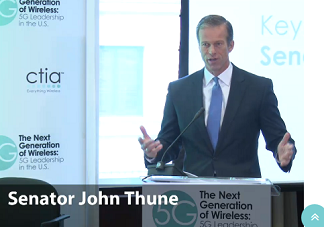Thune Signals Return of Mobile Now Act
The smarter way to stay on top of the multichannel video marketplace. Sign up below.
You are now subscribed
Your newsletter sign-up was successful

Senate Commerce Committee chairman John Thune (R-S.D.) said that, in concert with ranking member Bill Nelson (R-Fla.), he is putting the finishing touches on his bill to boost development of 5G wireless broadband service at potentially multiple-gigabit speeds, in competition to cable broadband.
Speaking at a CTIA 5G conference in Washington Tuesday (Feb. 9), Thune said he has been working on a new draft of the Mobile Now (Making Opportunities for Broadband Investment and Limiting Excessive and Needless Obstacles to Wireless) Act, which he hoped to be able to introduce later this week.
The bill has been in the works for a while, but was pulled from a planned markup last fall.
He said the bill would "insure that hundreds of megahertz of spectrum would be made available for commercial use by 2020," which he pointed out was about the same time the 5G standard could be rolled out. He said the bill would "cut through much of the bureaucratic red tape that makes it difficult to build wireless facilities on federal properties." It would also "direct the FCC to streamline regulations affecting small-cell networks."
Thune said that perhaps most importantly, the bill would push the FCC to examine millimeter wave (high-frequency bands) to determine which are most useful for 5 G. He said those would be the most critical for delivering the multi-gigabit high speed broadband service.
He pointed out that Starry is already planning millimeter wave, high-speed wireless broadband service using current gen technology.
Thune talked loftily about the possibilities of high-speed wireless broadband, saying that to him, 5G did not mean as-yet unwritten tech specs, but a not too distant future in which "unbridled activity meets nearly unbounded capacity unlocking limitless possibility."
The smarter way to stay on top of the multichannel video marketplace. Sign up below.
He suggested the FCC should clear away regulatory obstacles rather than regulate as though wireless were not a growing competitor to wired cable.
But Thune said the days of easy spectrum are over, and that Congress was going to have to do some heavy lifting going forward rather than picking bands of underutilized spectrum and auctioning them for tens of billions of dollars.
He said he could not exaggerate how much more difficult it will be to identify new bands of spectrum for broadband.
Thune said the bill would build on last year’s Spectrum Pipeline Act and that while 5G may be years away, incremental steps toward it must be taken now.
Thune said there is work in the House on a wireless spectrum bill and they should be able to combine those efforts.
Contributing editor John Eggerton has been an editor and/or writer on media regulation, legislation and policy for over four decades, including covering the FCC, FTC, Congress, the major media trade associations, and the federal courts. In addition to Multichannel News and Broadcasting + Cable, his work has appeared in Radio World, TV Technology, TV Fax, This Week in Consumer Electronics, Variety and the Encyclopedia Britannica.

